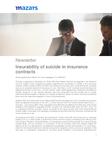
Insurability of suicide in insurance contracts
Through a judgment of December 19, 2018, with Ariel Salazar Ramírez as rapporteur, the Supreme Court of Justice (CSJ) changed its position regarding the insurability of suicide in the insurance contract. Initially, articles 1054 and 1055 of the Code of Commerce (Cco.) provide that the insurable risk, as an essential element of insurance (cf. art. 1045 ibid.), is the "uncertain event that does not depend exclusively on the will (...) of the insured", which would apparently exclude the insurability of suicide. However, in the referred decision, the CSJ concluded that the suicidal act is usually performed without freedom of decision or intention to defraud, reason for which, it can be insured and give rise to the indemnity obligation in favor of the beneficiary.
Articles 1054 and 1055 of the Civil Code provide that the insurable risk is the "uncertain event which does not depend exclusively on the will (...) of the insured" and "the merely elective acts of the (...) insured (...) are uninsurable". Now, according to the definition provided by the Dictionary of the Royal Academy of the Spanish Language (DRAE), suicide is "to voluntarily take one's own life". Thus, if it is understood that the voluntary nature of suicide is the same as that which the aforementioned articles make uninsurable, the necessary consequence would be that the insurance contract cannot insure suicide as a risk.
According to the DRAE, a voluntary act is that which "is born of the will, and not by force or necessity foreign to it" or, in other words, is that which comes from the "faculty of deciding and ordering one's own conduct". Based on these definitions, it is necessary to point out that suicide, as a result of giving oneself death, can be voluntary or involuntary. It will be voluntary when the subject makes the decision to die in a spontaneous, considered and meditated manner and executes it; or involuntary, when it is the result of actions or situations beyond the subject's control, such as an accident, in the first case, or uncertainty, uneasiness or any other acute condition, in the second. Articulating the above with the provisions of articles 1054 and 1055 of the Civil Code, it is necessary to conclude that suicide may be an insurable risk, whenever it is involuntary, according to the scope previously given to this expression, or uninsurable, whenever it is purely voluntary.
With this judgment of December 19, 2018, the Supreme Court of Justice, with Dr. Ariel Salazar Ramirez as the reporting judge, brought all these issues to consideration when deciding a dispute in which the insurability of the suicide of the insured was discussed, within the framework of an insurance contract and, therefore, the existence of the indemnification obligation in the head of the insurer and in favor of the beneficiaries.
In this regard, Dr. Salazar Ramirez considered that the suicidal act is usually performed without freedom of decision, unlike the acts that are executed by the exclusive will or merely voluntary act of the insured, according to articles 1054 and 1055 of the Civil Code, and which implicitly entail the intention to defraud, to conclude that only in these cases, the suicide is uninsurable and excuses the insurer from paying the corresponding indemnity.


